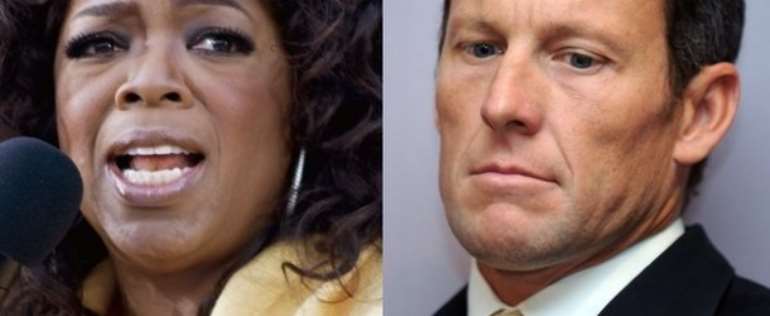Lance Armstrong admits doping, apologises in Oprah Winfrey's show

Lance Armstrong has admitted using performance-enhancing drugs during all seven of his Tour de France wins.
The 41-year-old made the admission during an interview with Oprah Winfrey.
“I view this situation as one big lie I repeated a lot of times,” he said. “I made those decisions, they were my mistake and I’m here to say sorry.”
However Armstrong denied it was “sport’s biggest doping programme”, saying “it was smart, but it was conservative, risk averse”.
After years of denials, Armstrong told Winfrey:
- he took performance-enhancing drugs in each of his Tour wins from 1999-2005
- doping was “part of the process required to win the Tour”
- he did not feel he was cheating at the time and viewed it as a “level playing field”
- he did not fear getting caught
- “all the fault and blame” should lie with him
- he was a bully who “turned on” people he did not like
- his cancer fight in the mid-1990s gave him a “win-at-all costs” attitude
- he would now co-operate with official inquiries into doping in cycling.
The body said he led “the most sophisticated, professionalised and successful doping programme sport has ever seen”.
The American decided not to contest the charges, saying last year he was tired of fighting the allegations. He had always strongly denied doping.
But Armstrong told Winfrey: “All the fault and blame is on me and a lot of that is momentum and I lost myself in all that. I couldn’t handle it. The story is so bad and toxic and a lot of it is true.”
Asked if doping was part of the process required to win the Tour, he said: “That’s like saying we have to have air in our tyres or water in our bottles. It was part of the job.
“I don’t want to make any excuses, but that was my view and I made those decisions.”
In a key exchange Winfrey asked: “Did it feel wrong?
Armstrong replied: “No. Scary.”
“Did you feel bad?”
“No. Even scarier.”
“Did you feel that you were cheating?”
“No. The scariest.”
Armstrong continued: “The definition of a cheat is to gain an advantage on a rival or foe. I didn’t view it that way. I viewed it as a level playing field. I didn’t understand the magnitude of that. The important thing is that I’m beginning to understand it.
“I see the anger in people, betrayal. It’s all there. People who believed in me and supported me and they have every right to feel betrayed and it’s my fault and I’ll spend the rest of my life trying to earn back trust and apologise to people.”
On whether it was the biggest doping programme in sport he said: “I didn’t have access to anything that anybody else didn’t.
“Winning races mattered for me but to say that programme was bigger than the East German doping programme of 70s and 80s is wrong.”
Armstrong said his battle with cancer in the mid-1990s turned him into a “fighter”.
“Before my diagnosis I was a competitor but not a fierce competitor,” he said. “I took that ruthless win-at-all-costs attitude into cycling which was bad.”
Armstrong denied riders had to comply to a doping programme to compete for the team, but admitted his personality could imply that.
He said: “Yes, I was a bully. I was a bully in the sense that I tried to control the narrative and if I didn’t like what someone said I turned on them.
“We felt like we had our backs against the wall and I was a fighter.”
Armstrong said he had not been not afraid of getting caught. “Testing has evolved. Back then they didn’t come to your house and there was no testing out of competition and for most of my career there wasn’t that much out-of-competition testing so you’re not going to get caught because you clean up for the races.
“I didn’t fail a test. Retrospectively, I failed one. Hundreds I passed because there was nothing in the system.”
Armstrong retired from cycling in 2005 but returned to the sport between 2009 and 2012.
He told Winfrey that he did not use drugs after his return to the sport. “That’s the only thing in that whole Usada report that really upset me,” he said.
Armstrong said he regretted his return, and was asked if he would have “got away with it” if he had not come back.
“Impossible to say,” he replied, but added his “chances would have been better”.
Armstrong said he would now co-operate with Usada. ” I love cycling and I say that knowing that people see me as someone who disrespected the sport, the colour yellow,” he said.
“If there was a truth and reconciliation commission – and I can’t call for that – and I’m invited I’ll be first man through the door.”
Asked if his former doctor Michele Ferrari, who was banned for life by Usada, was the “mastermind”, Armstrong said: “No. I’m not comfortable talking about other people.
“I viewed Dr Michele Ferrari as a good man and I still do.”
He said he regretted “going on the attack” against masseuse Emma O’Reilly, who was an early whistleblower.
“She is one of these people that I have to apologise to,” he said. “She’s one of these people who got run over, got bullied.”
He denied a donation to the UCI was to cover up a failed drugs test. “It was not in exchange for help,” he said. “They called. They didn’t have a lot of money. I did. They asked if I would make a donation so I did.” (BBC)
